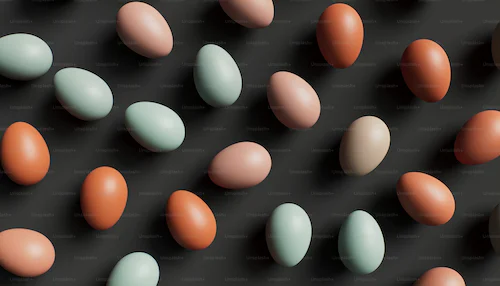Eggs are a staple food in many households and a versatile ingredient used in various dishes worldwide. However, for people following a vegan lifestyle, eggs are off-limits due to animal cruelty and exploitation concerns. Vegan eggs offer a cruelty-free and sustainable alternative for vegans while providing similar nutritional benefits.
What Are Vegan Eggs?
Vegan eggs are plant-based alternatives to traditional eggs that mimic the texture, taste, and nutritional benefits of eggs. They are made from various plant-based ingredients, such as tofu, aquafaba, and egg replacers. Vegan eggs come in different forms, including liquid, powder, and ready-to-eat products.
Nutritional Benefits of Vegan Eggs
Vegan eggs offer a variety of nutritional benefits, including:
- Lower in cholesterol: Traditional eggs are high in cholesterol, whereas vegan eggs contain none.
- High in protein: Vegan eggs contain similar amounts of protein as traditional eggs.
- Rich in vitamins and minerals: Vegan eggs are fortified with vitamins and minerals, such as vitamin B12 and iron.
How Are Vegan Eggs Different from Traditional Eggs?
Nutritional Differences
Vegan eggs have some significant nutritional differences from traditional eggs. Traditional eggs are high in cholesterol, saturated fat, and calories, which can lead to various health concerns. On the other hand, vegan eggs are free from cholesterol and contain less saturated fat, making them a healthier alternative.
Production Methods
Traditional eggs are produced by hens in farms, where they are confined to small cages and subjected to harsh living conditions. Vegan eggs, on the other hand, are produced using plant-based ingredients, making them a more sustainable and cruelty-free option.
Types of Vegan Eggs
Tofu Scramble
Tofu scramble is a popular vegan egg alternative made from tofu and spices. It is an excellent substitute for scrambled eggs, omelets, and frittatas. Tofu scramble is high in protein and low in fat, making it a healthy and nutritious option.
Aquafaba
Aquafaba is the liquid left over from cooking chickpeas and other legumes. It is an excellent egg white substitute and can be used in various recipes, such as meringues, macarons, and mayonnaise. Aquafaba is a rich source of protein and fiber, making it a healthy and sustainable option.
Vegan Egg Replacements
There are various vegan egg replacements available in the market, such as VeganEgg, Bob’s Red Mill, and Ener-G
Eggs are a staple food in many households and a versatile ingredient used in various dishes worldwide. However, for people following a vegan lifestyle, eggs are off-limits due to animal cruelty and exploitation concerns. Vegan eggs offer a cruelty-free and sustainable alternative for vegans while providing similar nutritional benefits.
Nutritional Benefits of Vegan Eggs
Vegan eggs offer a variety of nutritional benefits, including:
- Lower in cholesterol: Traditional eggs are high in cholesterol, whereas vegan eggs contain none.
- High in protein: Vegan eggs contain similar amounts of protein as traditional eggs.
- Rich in vitamins and minerals: Vegan eggs are fortified with vitamins and minerals, such as vitamin B12 and iron.
Vegan Egg Replacements
There are various vegan egg replacements available in the market, such as VeganEgg, Bob’s Red Mill, and Ener-G. These products come in different forms, such as powder, liquid, and ready-to-eat products.
How to Use Vegan Eggs in Recipes?
Vegan eggs can be used in various recipes to replace traditional eggs. Here are some ways to use vegan eggs in recipes:
Baking
Vegan eggs can be used in baking recipes, such as cakes, muffins, and bread. They can be used as a substitute for eggs in recipes by using various vegan egg replacements or by using ingredients such as applesauce, mashed bananas, or chia seeds.
Vegan Eggs and Protein
Protein is an essential nutrient for our bodies, and eggs are often considered a good source of protein. However, vegan eggs can also provide a significant amount of protein. For example, tofu scramble contains around 10 grams of protein per 100 grams, while aquafaba contains around 1 gram of protein per 3 tablespoons.
Additionally, there are various other plant-based sources of protein that can be used in recipes alongside vegan eggs, such as beans, lentils, nuts, and seeds. Combining these ingredients can create a well-rounded and nutritious meal that is high in protein and other essential nutrients.
Vegan Eggs and Allergies
One of the primary reasons people choose vegan eggs is to avoid allergens that are commonly found in traditional eggs. Egg allergies are relatively common, especially in children, and can cause severe reactions, including anaphylaxis.
Vegan eggs offer an alternative for people with egg allergies, allowing them to enjoy egg-based dishes without the risk of an allergic reaction. It’s important to note that some vegan egg replacements may contain allergens such as soy or gluten, so it’s crucial to read the ingredients list carefully and choose options that are safe for your specific allergy.
Vegan Eggs and Ethics
Finally, many people choose vegan eggs for ethical reasons, as they want to reduce their impact on animal welfare. The egg industry is known for its inhumane treatment of chickens, including cramped living conditions, forced molting, and early slaughter. By choosing vegan eggs, you can support a more humane and ethical food system and reduce your contribution to animal suffering.
Conclusion
In conclusion, vegan eggs are a plant-based alternative to traditional eggs that offer similar nutritional benefits while being cruelty-free and sustainable. Vegan eggs come in different forms, including tofu scramble, aquafaba, and egg replacements, and can be used in various recipes. Vegan eggs are a healthier option as they contain no cholesterol and are lower in saturated fat. Incorporating vegan eggs into your diet can be an excellent way to add variety and nutrition to your meals.

